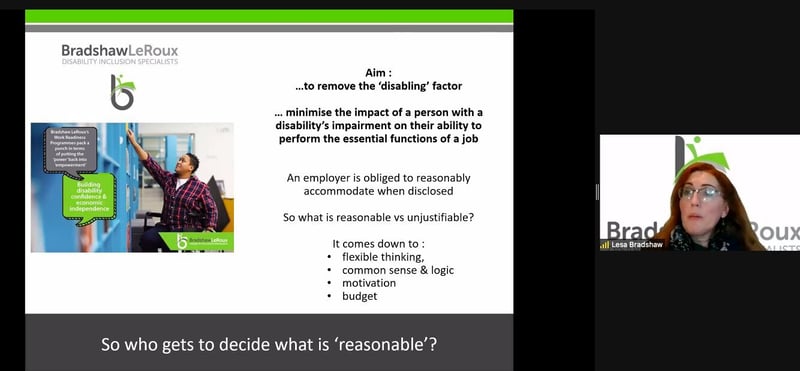Employed only because the law is on our side
Written by: QuadPara Association of South Africa Save to Instapaper
The employment of people with disabilities are invaluable to our society. It empowers the individual as well as businesses. However, many misconceptions make it difficult for people with disabilities to find employment. The QuadPara Association of South Africa (QASA) held an Employment Workshop in May to explore how businesses can benefit from the employment of people with disabilities and to dispel misconceptions.
QASA Chief Operating Officer, Raven Benny, noted during the workshop: “A lack of knowledge on how to manage people with disabilities in the workplace is the biggest factor to impact on the employment of people with disabilities.”
This lack of knowledge extends to how to accommodate people with disabilities in the workplace and communicate effectively. In addition to the lacking knowledge, many employers have a misperception that employing a person with a disability might be costly.
“People with disabilities only have employment opportunities because the law is on our side,” said former QASA Chief Executive Officer and current disability advocate, Ari Seirlis, in reference to the Broad-Based Black Economic Empowerment legislation. He continued to note that businesses fail to see the value proposition that people with disabilities offer.
Fortunately, the QASA workshop dispelled the misconceptions and highlighted the value that people with disabilities offer.
Accommodating
A big concern for businesses is the perceived cost of adapting a work environment to make it accessible for a person with a disability. However, there are many cost-effective ways to accommodate people with disabilities.
Ari urged businesses to “step into the digital space with people with disabilities”. Virtual or remote work opportunities can be ideal as it requires little to no accommodations for example only a small internet stipend or device.
For businesses that prefer or need their staff in the office, small accommodations can be made. Universal access specialist, Mandy Latimore, noted that a simple accommodation like leaving a cup on the counter rather than the wall-mounted cupboard could make it easier for a wheelchair user to be included in the work environment.
Founder of Bradshaw LeRoux, a disability recruitment agency, Lesa Bradshaw stated the importance of focusing “less on the disability and more on the disabling factors.” For example, a person might use a wheelchair, but the lack of a ramp or lift is what inhibits them from entering a building.
Lesa continued to note that accommodating people with disabilities could benefit the entire workforce, and perhaps customers as well. Installing a ramp, for example, could benefit wheelchair users and staff who are pregnant, elderly, or perhaps recovering from an injury or operation.
Communication
Unfortunately, most people are unfamiliar with disability and can find it challenging or intimidating talking to a person with a disability. There are resources freely available to assist such as the QASA Sawubona booklet which discusses the correct terminology and etiquette to use in order to avoid offending people with disabilities. But mostly, people simply need to be respectful and discreet. Businesses especially need to avoid highlighting the person’s disability unnecessarily.
Lesa gave an example of a client who employed a person with epilepsy. The staff needed training on what to do when the individual had an epileptic attack, but they didn’t want to single out the new co-worker. In response, the company provided general health and safety training with a section dedicated to epilepsy; thus, avoiding singling out the person and highlighting their disability while providing valuable information.
QASA offers a Work Readiness Programme to provide its members with soft skills to work in a professional environment. Businesses that participate by providing placements for the programme participants can benefit from the support QASA offers to integrate the learner. This could include an accessibility report or mediator services.
Whichever path best suits a business, employers can greatly benefit from including people with disabilities in their organisations. As Lesa pointed out: “Diversity provides new ways to look at your products.” The right knowledge and support can make employing a person with a disability very easy.
-- ENDS --
PHOTO CAPTION: Lesa Bradshaw presenting on reasonable accommodation during the QASA Employment Workshop in May.
NOTE FOR EDITORThe QuadPara Association of South Africa is a non-profit organisation that seeks to empower quadriplegics and paraplegics in South Africa through education and employment opportunities, as well as through funding assistive devices (such as wheelchairs and wheelchair cushions). Among the prestigious programmes is the Driving Ambitions Programme, which assist people with disabilities to obtain their driver’s licence; and Work Readiness Programme, which teaches the soft skills required to operate in an office complimented with a learnership/placement opportunity.
To learn more about QASA, visit the website at https://qasa.co.za or contact us on This email address is being protected from spambots. You need JavaScript enabled to view it..
Get new press articles by email
Latest from
- QuadPara Association of South Africa (QASA) Urges Water Safety Following Recent Spinal Injuries- ONE DIVE. ONE MOMENT. A LIFETIME CHANGED
- Buckle up for the biggest festive gift
- 67 Minutes to moola keeps quadriplegics and paraplegics moving
- QASA needs your hands
- Loadshedding life-threatening to people with disabilities
- Priority vaccination plea to save lives
- Relief Fund for people with disabilities
The Pulse Latest Articles
- Opinion Piece: Activating Leadership To Engage The Passive Workforce (February 11, 2026)
- Tchagra Trail Wilderness Consulting Launches A New Safari Experience In Photography And Tracking (February 9, 2026)
- Magic: The Gathering Releases Lorwyn Eclipsed (February 6, 2026)
- Back To Work, Back To Balance: Rethinking The 3pm Slump (February 5, 2026)
- Back-to-school Lunchboxes That Just Make Sense (February 5, 2026)
